'The Chinese have a set pattern. They demonstrate, warn, threaten, attack and withdraw.'
'We were lulled into complacency, but I am certain things are being corrected now.'
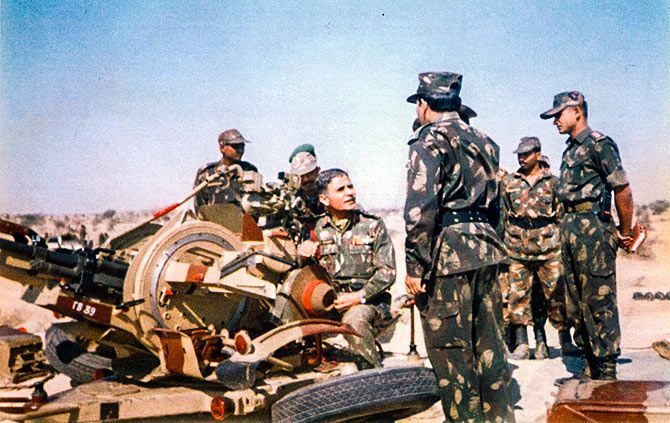
Lieutenant General Zameer Uddin Shah, former deputy chief of the army staff and former vice chancellor, Aligarh Muslim University, writes about the tardy initial reaction of the civil administration and the role of the partisan and politicised police during the Gujarat riots in his memoir The Sarkari Mussalman.
Three thousand troops had to wait for a day at the air field because the civil administration had not arranged for vehicles to transport them to areas that were raging with communal violence.
A day later when the army deployed -- 'What 110 companies of the paramilitary and police could not do was done by six army battalions (24 companies) in 48 hours,' the general recalls in The Sarkari Mussalman.
General Shah was awarded the Sena Medal for his service to the nation in quelling the riots.
In the final part of his interview with Rediff.com's Archana Masih, General Shah explains why there is no military solution to insurgency, points out the error of publicising surgical strikes, reveals the humiliation meted out to him by then HRD minister Smriti Irani and says he does not mind living under his younger brother Naseeruddin Shah's shadow.
- Part I of the interview: 'It has become fashionable to be hate mongers'
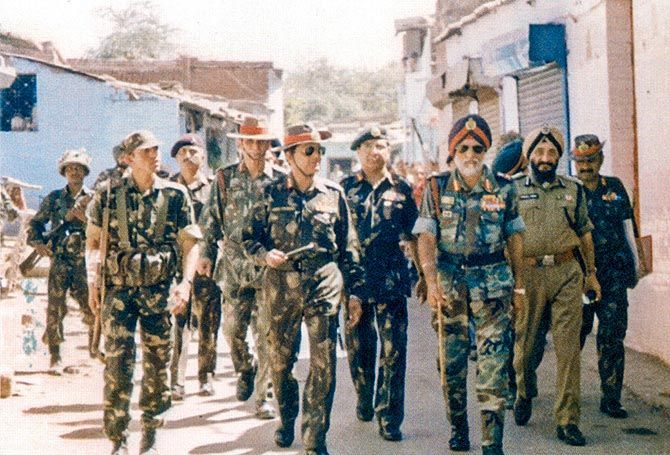
You were awarded a Sena Medal for your duties in the Gujarat riots. Have you had a chance to go back to the state after those two months spent there?
Unfortunately, not. I have very close friends there, especially among the Bohra community. They were the worst victims of the violence and I saw it with my own eyes.
The Bohras are the banias of Gujarat. They have made peace and strung their lives back. I don't know about the rest of the Muslim community in Gujarat because I haven't gone back, but if they follow the Bohra example, it would ensure that peace and normalcy is returned.
You first met Mr Modi as chief minister on that night of February 28, 2002 when rioting was at its peak in Gujarat and have had occasion to meet him subsequently. He has known you for 15 years. What have been your impressions of him?
I have seen a sea change. In May 2014, the press asked me if I had any problems if he became prime minister. I always quote Thomas Beckett -- 'The moment a person is given responsibility, he changes'.
I can say with authority that the anti-Muslim tirade of the PM before he assumed office ended. I did not hear it any more because he realised that he is the leader of the whole country.
I did see a remarkable change in his demeanour and language -- and for some inexplicable reason he has always been warm to me. That is something I am encouraged by.
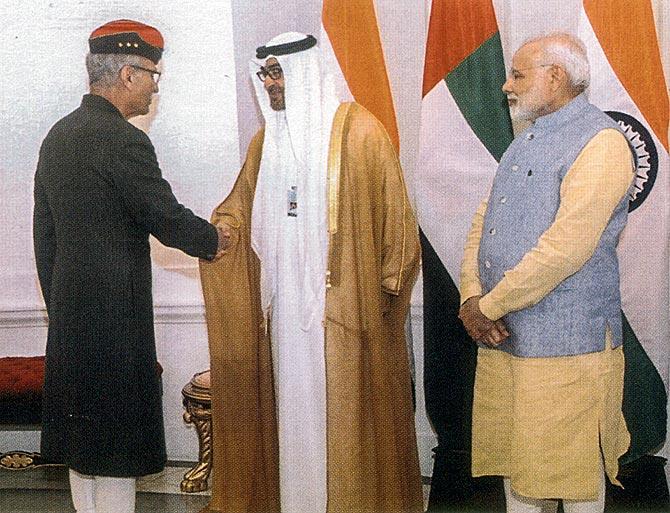
You had a difficult time dealing with then HRD minister Smriti Irani. Have you had any interaction with her since?
Fortunately, not.
I mention in the book that she started her interaction with 60 VCs, saying 'Gentlemen, I am an actress, histrionics are part of my nature.'
You don't say such things to a body of intellectuals. This was a ploy to browbeat them into submission and that's the reason she didn't like me at all.
An educationist would be worried about his next tenure, but I had nothing to lose.
She was also under the mistaken impression that I was projecting myself as a leader of the Muslim community.
I told her 'Madam, leave the AMU as it is as Indian Muslims have a lot of sentiment for that university.' I too had sentiment because it had educated generations of my family -- my grandfather, father, brother. She took a stand and tried to humiliate me.
But it takes more than that sort of behaviour to humiliate a veteran of 1971.
Your book reveals she spoke very rudely to you when you met her along with the chief minister of Kerala who had requested you to attend the meeting.
She changed the venue of the meeting from the office to her home at the last minute at the express purpose of humiliating me. At her office she couldn't have behaved like that with me. I could have walked out with the whole delegation.
In her home, she told me, 'Who invited you?'
I thought it was better to honourably withdraw.
Are you out of your brother Naseeruddin Shah's shadow after spending 40 years in the army, 5 years as vice chancellor and being written about in the media yourself?
It never bothered me. The Indian public is so star struck that they can't resist asking me if he is my brother.
He is the best actor in the country and I am not the best soldier.
But he says he is an actor because you are a good soldier.
He is magnanimous. We three brothers did well because of the schooling we got (The general's elder brother Zaheer Uddin Shah is an alumnus of IIT-Kharagpur).
Nobody dare discriminate against educated people. On the strength of education you can break through the barriers of discrimination.
What are some of your brother's films you have liked most?
I liked his performance in the TV series Mirza Ghalib. He is the face of Ghalib. Whenever they want to depict Ghalib, they put Naseer's photograph with that cap because they don't have a portrait of Ghalib.
I also liked Mirch Masala, Jaane Bhi Do Yaaron, Dirty Picture.
I called him and told him you behaved just like MGR in Dirty Picture. I was in Madras when MGR was at the height of his popularity.
There's no better actor than Naseer.
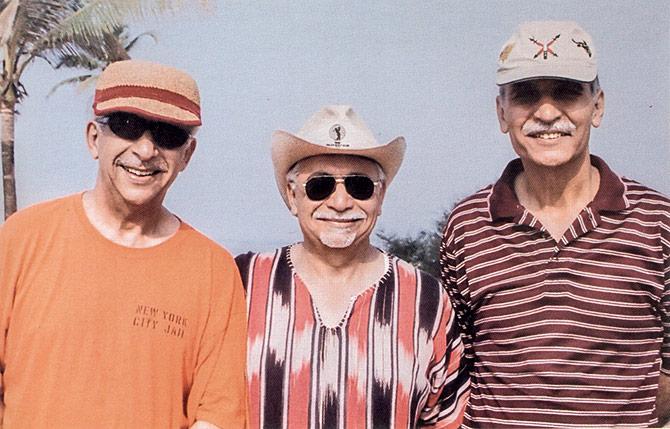
You write about the army conducting operations in Myanmar and believe such surgical strikes should not be publicised. Why?
It should be done quietly. Why do you want to endanger the lives of participating troops? The British SAS doesn't talk of its operations. Their honours and awards are never publicised.
It is a blunder to publicise these operations which we have been doing for many, many years.
I believe in the policy -- speak softly, but carry a big stick. Do it, but don't talk about it.
Why do you feel China is India's biggest adversary? Has the concentration on Pakistan resulted in the neglect of meeting a possible Chinese threat?
Pakistan is a small country. They are no match for us.
The Chinese have a set pattern. They demonstrate, warn, threaten, attack and withdraw. These are the five stages of the Chinese everywhere.
We were lulled into complacency, but I am certain things are being corrected now.
You say there is no military solution to insurgency or to pellet guns and that winning hearts and minds is important, but when Kashmiris are killing their own and the ranks of homegrown militants are growing -- are we losing the battle in Kashmir?
It appears to be. We haven't won the battle in Nagaland where the insurgency has been going on for 70 years.
But there is a lot of difference.
In the north east, we don't believe in collateral damage, we don't believe in using pellet guns, women used to come out in support (of the rebels) and surrounded us, but we never fired at them.
We used dyed grenades which splashed semi permanent colour on their faces.
Pellet guns should not be used. It takes three generations to forget -- like with Partition.
The family of a relative killed in military firing would be prone to hostile propaganda and would have no concerns of the country.
If your house is burnt, what loyalty would you have for the country?
We have to get rid of the notion that collateral damage is acceptable because it is not.
In Nagaland and Manipur, the peace process carried on for 70 years. We didn't get tired, stop the peace process and resort to military methods.
The civil process has to continue. It will take time.
The Kashmir insurgency is from 1990 onwards; problems in the north east have been since 1947 onwards and still simmering.
Let us not be impatient. Patience, forbearance and minimal use of force is what will weaken the movement of anti-nationals.
There is no military method of fighting insurgency.
How can Kashmiri youth be brought into the mainstream?
A lot of money is being pumped into Kashmir, but it is going into the wrong hands. Since these frustrated, educated youth don't have an occupation, they pick up a gun, and they are paid.
Economic prosperity will make them give up the path of lawlessness and insurrection.
We can try a bold experiment which we did in Nagaland. We offered general amnesty and converted the insurgents into two BSF battalions. It is a risk, but a risk worth taking.
You say AFSPA cannot be abolished, but needs to be re-examined. What changes does it need?
People are concerned about the human rights of the population, what about the human rights of soldiers?
They are doing an unpleasant duty for the country. If you tie their hands behind their back, let me tell you they will not be able to perform.
If you want to hamstring the army, then abolish AFSPA. But we need to take care that the army does not misuse it. I am for its retention, but with a few modifications.
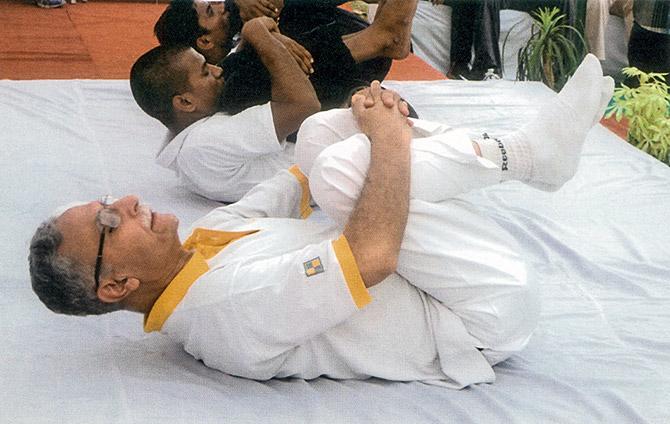
How different are the young officers today from officers of your time?
They are better, if not as good. Of course, they don't have the spit and polish of the old timers, but I have seen them in action and they are magnificent
The recent incident in Bomdilla highlighted civil-military conflict. How does it affect both sides?
It certainly affects the military. The civil administration has become bloated with high ranking officials.
Earlier, the SP was equivalent to a captain in a district. He was called 'Kaptaan sahib'. But now the district SP is of the rank of DIG or SSP.
The absence of SPs, DSPs has spoilt the working equation with captains and majors at the district level. They don't bother about army officers, especially colonels.
The response of the civil authority to a letter from the army is very tardy.
Most suicides in the army are not related to military affairs, but to domestic trouble which the civil authority has not attended to.
The civil administration must respond and react to requests by the army for resolving problems of servicemen living in operational areas.










